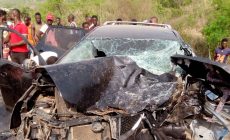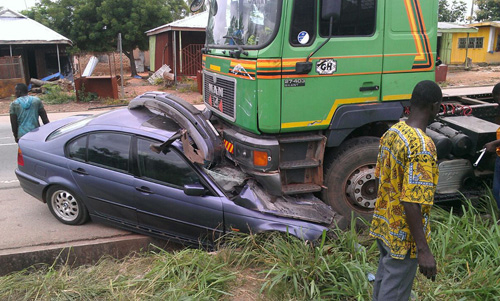Comparing these statistics with those for the same period in 2015, it is noted that the road crashes increased from 5,501 in 2015 to 6,205 in 2016, representing a 11.34 per cent rise, while the number of vehicles involved in the accidents increased from 8,544 in 2015 to 9,636 in 2016, representing an increase of 11.33 per cent.
For those who were injured, the number increased from 4,093 in 2015 to 5,302 in 2016, constituting an increase of 22.80 per cent, while the number of fatalities increased from 931 in 2015 to 1,034 in 2016, a 9.93 per cent rise.
On a regional basis, the Greater Accra Region recorded the highest number of deaths from road crashes in the first half of 2016 with 227, with Brong Ahafo recording 179; Eastern, 146, and Ashanti, 127.
The rest are Volta, 81; Western, 80; Central, 71; Northern, 62; Upper East, 32, and Upper West, 29.
Road Safety Training
The Executive Director of the NRSC, Mrs May Obiri-Yeboah, made this known at the opening of a five-day international course to build the capacity of road safety professionals within the West African sub-region.
The training, which brought together stakeholders in road safety management from the participating countries, is aimed at equipping road safety professionals with knowledge on effective road safety strategies, action plans and projects.
Organised by the NRSC and supported by the Federal Road Safety Corps in Nigeria and the World Bank, the course is facilitated by an Emeritus Professor in Traffic Safety, Prof. Fred Wegman, of the Delft University of Technology in The Netherlands.
The topics include principles of safe system approach, road safety management, risks on roads, road safety interventions, among other issues.
Road crashes are concern
The NRSC estimates that six persons are killed every day and 2,000 die annually due to road crashes in the country.
Majority of those who die from road crashes are between 18 and 45 years, with about 75 per cent of them being males.
While expressing concern over the level of road crashes, Mrs Obiri-Yeboah attributed the causes of road accidents to speeding, bad roads, lack of driving experience, fatigue, abuse of alcohol and drugs and distractions while driving.

Although some efforts had been ongoing in the area of education, she said more needed to be done to enhance the skills and capacity of road safety officers to better manage the roads.
Localise approach
The course, she said, was, therefore, to bring together stakeholders, including the police, ambulance services and the Driver and Vehicle Licensing Authority (DVLA), to work hand in hand to improve on their services.
She called on stakeholders in road safety issues to come together and enforce existing policies to prevent road accidents.
In his address, Prof. Wegman observed that road safety was really not a priority for most governments, saying: “The course aims to bring road safety to a higher priority for governments.”
He added that the training was also to localise approaches that had worked in Western countries to enable the safety professionals to better and properly manage the roads.
-Graphic











 (Selorm) |
(Selorm) |  (Nana Kwesi)
(Nana Kwesi)